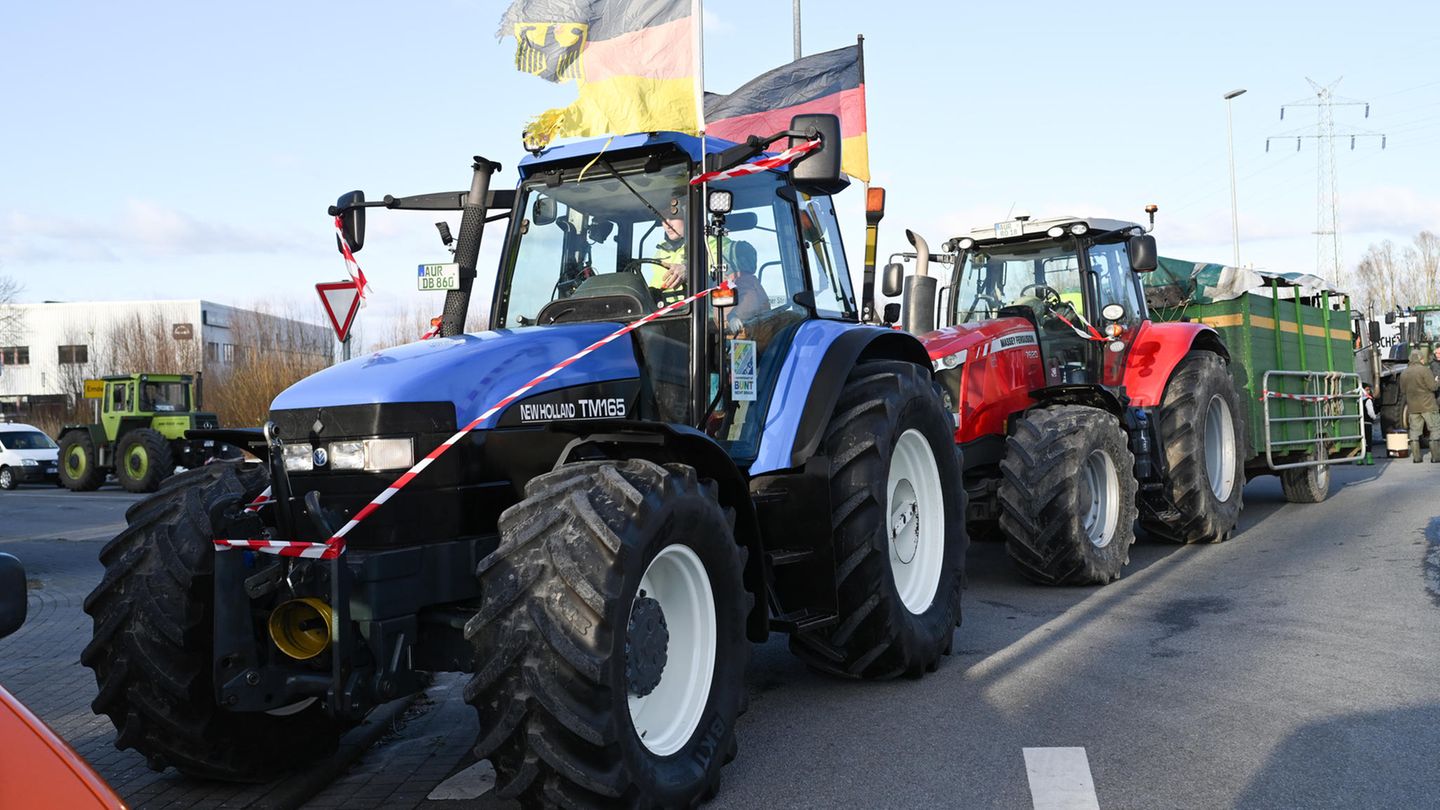On Monday, German farmers began their nationwide week of action against cuts in agricultural subsidies. They drove tractors through numerous cities and blocked highway entrances. The press reviews.
Long convoys of tractors and trucks moved through numerous cities on Monday, and countless motorway entrances were temporarily blocked nationwide: The farmers’ week of action against the federal government’s agricultural policy caused a stir in Germany. This is what the press says:
“Handelsblatt”: “The farmers are expecting a completely exaggerated rebellion. What they ignore: German agriculture is highly subsidized, far too high. And it will remain so, even with a slightly lower diesel subsidy. German farmers have managed to romanticize themselves as altruistic rural dwellers. But they are entrepreneurs, and you can’t blame them for that at all. But they should be treated the same way. However, anyone who looks at the subsidy policy in Germany and the EU realizes that this is not the case. That agriculture gets special treatment that is not only expensive but also harmful.”
“Taz”: The current farmers’ protests are inappropriate. The average farm will only lose around 1,700 euros per year if the federal government removes the energy tax rebate on agricultural diesel. With an average profit of 115,000 euros for full-time businesses, one thing is certain: this small loss will not drive any farm into bankruptcy. It is all the more irresponsible that organizations like the farmers’ association are now stoking the anger of many farmers against the traffic light coalition. For a comparatively trivial reason – the 1,700 euros per year – the agricultural lobby has sparked a wave of protests that can easily get out of hand. Right-wing extremists exploit them diligently. Corresponding posters were seen in several places – in Wiesbaden, for example, “Kill Özdemir” and in Berlin “Your democracy is the death of our people.” The extremists want to turn the protest against subsidy cuts into a fight against the traffic lights and liberal democracy.
“Kölner Stadt-Anzeiger”: “The conflict in both sectors could have been avoided or resolved if people had continued to talk. From the beginning, the train drivers’ union (GDL) had nothing other than a strike planned. They went into the collective bargaining negotiations with virtually no will to negotiate . And without warning, the traffic lights threw a double whammy at the farmers’ feet with cuts in agricultural subsidies for both diesel and vehicle tax. But there has been a lot of movement since then: the railway is offering concessions and the government has made the cuts clear weakened. Now GDL and farmers don’t have to shout “Hurray” straight away. However, they would first have to seriously declare themselves willing to talk. That is essential for a democracy.”
Farmers don’t feel like they’re being taken seriously
“Nuremberger Zeitung”: “The protest is also understandable because the feeling has become established in the peasantry that they are no longer taken seriously in big politics and that they are seen as crooks who are greedy for subsidies but unwilling to change. And what are you supposed to do on the farms of the Republic “What do you think about the austerity policy of a government that wasn’t even supported by the responsible minister, Cem Özdemir?”
“Mitteldeutsche Zeitung”: “Whether in animal welfare, the use of pesticides or the application of fertilizer: society, the citizens, are increasingly making legitimate demands on farmers. Politicians – especially the Greens – are taking this up. Conflicts with farmers are therefore inevitable. This was already the case during the term of office of Chancellor Angela Merkel (CDU). But instead of developing a concept for how agriculture can be converted to be climate-friendly and sustainable, the government is only delivering piecemeal. Even if the abolition of diesel subsidies is unlikely to cause a farm to survive, the farmers’ dissatisfaction is entirely understandable. They are supposed to plug a financial hole that the government has created for itself.”
“Reutlinger General-Anzeiger”: “The traffic light government made a mistake with its sudden cut in agricultural diesel subsidies and partially reversed it. But anyone who believes that a government resignation would improve the situation of farmers is making a milkmaid’s calculation. For a real improvement in the situation of the farms, they would have to Consumers are willing to spend more money on high-quality local food. However, it is easier to protest against “those up there.”
“Swabian newspaper”: “The farmers in Germany have impressively demonstrated their power. There is no question about it: protests are allowed in a democracy and, to a certain extent, legitimate. But when gallows hang on tractors, a minister is harassed in private and people are sometimes not sufficiently clear about right-wing extremists demarcated, this goes beyond a tolerable level. Real dispute is indispensable in a democracy, but it also thrives on compromise. The principle no longer works if every social group ruthlessly exploits its power and only insists on maximum demands. If at the same time the “If social glue is crumbling, the government is partly to blame. The traffic lights must finally be taken back and concentrate on the essentials. But the actors from business and society should also gather together and use common sense. Otherwise we are threatened with an ego republic of Germany – to the detriment of everyone.”
Source: Stern
I have been working in the news industry for over 6 years, first as a reporter and now as an editor. I have covered politics extensively, and my work has appeared in major newspapers and online news outlets around the world. In addition to my writing, I also contribute regularly to 24 Hours World.




